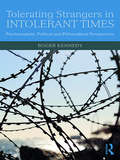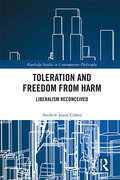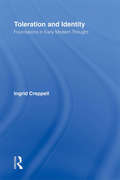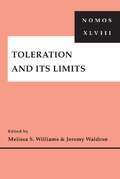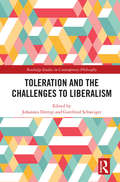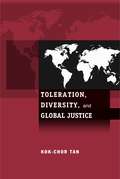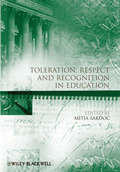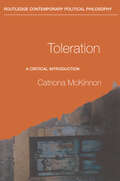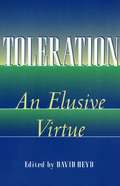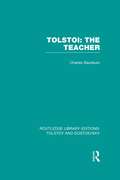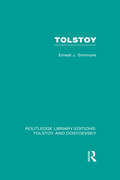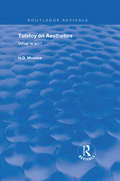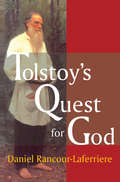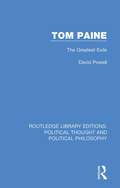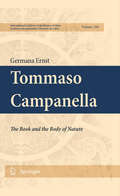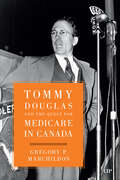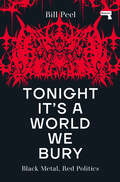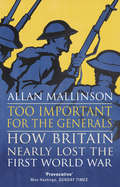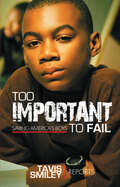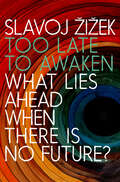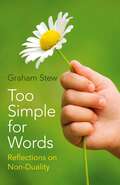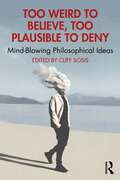- Table View
- List View
Tolerantziari buruzko tratatua
by François M. Arouet Voltaire Irati Bereau Baleztena1763ko otsailaren 20an, eskutitz hau idatzi zidaten Languedocetik: Tolerantziari buruz idatzi duen lana errukiz eta egiaz beterik dagoela iruditzen zait, baina beldur naiz ez ote dion mesede baino kalte gehiago egingo Calas sendiari. Izan ere, gurpilean hilaraztea agindu zuten zortzi epaileak erresumindu egin ditzake. Berorren liburua sutan erretzeko eskatuko diote parlamentuari, eta fanatikoek ?ez baitira desagertuko? amorru biziz erantzungo diote arrazoiaren ahotsari (?). Hauxe izan zen nire erantzuna: Tolosako zortzi epaileek, nahi badute, nire liburua erretzea agin dezakete; ez dago hori baino gauza errazagorik. Azken batean, Lettres provinciales gutunak ere erre zituzten, eta nire lana baino askoz ere baliotsuagoak ziren, ezbairik gabe. Norbera libre da gustuko ez dituen liburuak eta paperak etxean erretzeko.
Toleranz – was müssen wir aushalten? (#philosophieorientiert)
by Dominik BalgToleranz – eine Haltung, die in westlichen Gesellschaften wie kaum eine andere mit Nachdruck gefordert und mit Vehemenz verteidigt wird. Insbesondere eine tolerante Haltung gegenüber fremden Ansichten, Standpunkten und Überzeugungen wird von vielen als unverzichtbare Bedingung für das Gelingen eines demokratischen Miteinanders angesehen. Gleichzeitig wird kontrovers diskutiert, wo eigentlich die Grenzen einer toleranten Pluralität verschiedener Meinungen gezogen werden sollen. Welche Ansichten sind noch tolerabel, und welche nicht? Mit Blick auf aktuelle gesellschaftliche Diskurse und vor dem Hintergrund umfassender Kenntnisse der philosophischen Toleranzforschung überprüft Dominik Balg kontrovers diskutierte Minderheitenpositionen auf ihre Tolerierbarkeit und entwickelt vor diesem Hintergrund einen klaren Kriterienkatalog, mit Hilfe dessen sich die Grenzen einer toleranten Haltung sinnvoll ziehen lassen. Darüber hinaus widmet er sich der Frage, was eigentlich jenseits unserer Toleranzgrenzen liegen sollte und wie man verantwortungsvoll mit Positionen umgehen kann, die nicht mehr tolerabel sind.
Tolerating Strangers in Intolerant Times: Psychoanalytic, Political and Philosophical Perspectives
by Roger KennedyIn this interdisciplinary and wide-ranging study, Roger Kennedy looks at the roots of tolerance and intolerance as well as the role of the stranger and strangeness in provoking basic fears about our identity. He argues that a fear of a loss of attachment to one’s home might account for many prejudiced and intolerant attitudes to refugees and migrants; that basic fears about being displaced by so-called ‘strangers’ from our precious and precarious sense of a psychic home can tear communities apart, as well as lead to discrimination against those who appear to be different. Present day intolerance includes fears about the ‘hordes’ of immigrants confused with realistic fears about terrorist attacks, populist fears about loss of cultural integrity and with it a sense of powerlessness, and fearful debates about such basics as truth, including the so-called ‘post truth’ issue. Such fears, as explored in the book, mirror old arguments going back centuries to the early enlightenment thinkers and even before, when the parameters of discussion about tolerance were mainly around religious tolerance. There is urgency about addressing these kinds of issue once more at a time when the ‘ground rules’ of what makes for a civilized society seem to be under threat. Kennedy argues that society needs a ‘tolerance process’, in which critical thinking and respectful judgment can take place in an atmosphere of debate and reasonably open communication, when issues around what can and cannot be tolerated about different beliefs, practices and attitudes in people in our own and other cultures, are examined and debated. Tolerating Strangers in Intolerant Times, with the help of psychoanalytic, literary, social and political thinking, looks at what such a tolerance process could look like in a world increasingly prone to intolerance and prejudice. It will appeal to psychoanalysts as well as scholars of politics and philosophy.
Toleration and Freedom from Harm: Liberalism Reconceived (Routledge Studies in Contemporary Philosophy)
by Andrew Jason CohenToleration matters to us all. It contributes both to individuals leading good lives and to societies that are simultaneously efficient and just. There are personal and social matters that would be improved by taking toleration to be a fundamental value. This book develops and defends a full account of toleration—what it is, why and when it matters, and how it should be manifested in a just society. Cohen defends a normative principle of toleration grounded in a new conception of freedom as freedom from harm. He goes on to argue that the moral limits of toleration have been reached only when freedom from harm is impinged. These arguments provide support for extensive toleration of a wide range of individual, familial, religious, cultural, and market activities. Toleration Matters will be of interest to political philosophers and theorists, legal scholars, and those interested in matters of social justice.
Toleration and Identity: Foundations in Early Modern Thought
by Ingrid CreppellRecently, there has been a notable rise in interest in the idea of "toleration", a rise that Ingrid Creppell argues comes more from distressing political developments than positive ones, and almost all of them are related to issues of identity: rampant genocide in the 20th Century, the resurgence of religious fundamentalism around the world; and ethnic-religious wars in Eastern Europe and the Middle East. In Toleration and Identity, Creppell argues that a contemporary ethic of toleration must include recognition of identity issues, and that the traditional liberal ideal of toleration is not sufficiently understood if we define it strictly as one of individual rights and freedom beliefs. Moving back and forth between contemporary debates and the foundational writings of Bodin, Montaigne, Lock, and Defoe, Toleration and Identity provides a fresh perspective on two key ideas deeply connected to current philosophical debates and political issues.
Toleration and Its Limits: NOMOS XLVIII (NOMOS - American Society for Political and Legal Philosophy #33)
by Jeremy Waldron Melissa S. WilliamsToleration has a rich tradition in Western political philosophy. It is, after all, one of the defining topics of political philosophy—historically pivotal in the development of modern liberalism, prominent in the writings of such canonical figures as John Locke and John Stuart Mill, and central to our understanding of the idea of a society in which individuals have the right to live their own lives by their own values, left alone by the state so long as they respect the similar interests of others. Toleration and Its Limits, the latest addition to the NOMOS series, explores the philosophical nuances of the concept of toleration and its scope in contemporary liberal democratic societies. Editors Melissa S. Williams and Jeremy Waldron carefully compiled essays that address the tradition’s key historical figures; its role in the development and evolution of Western political theory; its relation to morality, liberalism, and identity; and its limits and dangers. Contributors: Lawrence A. Alexander, Kathryn Abrams, Wendy Brown, Ingrid Creppell, Noah Feldman, Rainer Forst, David Heyd, Glyn Morgan, Glen Newey, Michael A. Rosenthal, Andrew Sabl, Steven D. Smith, and Alex Tuckness.
Toleration and the Challenges to Liberalism (Routledge Studies in Contemporary Philosophy)
by Johannes Drerup Gottfried SchweigerThis book explores the relationship between different versions of liberalism and toleration by focusing on their shared theoretical and political challenges. Toleration is among the most pivotal and the most contested liberal values and virtues. Debates about the conceptual scope, justification, and political role of toleration are closely aligned with historical and contemporary philosophical controversies on the foundations of liberalism. The essays in this volume focus on the specific connection between toleration and liberalism. The essays in Part I reconstruct some of the major historical controversies surrounding toleration and liberalism. Part II centers on general conceptual and justificatory questions concerning toleration as a central category for the definition of liberal political theory. Part III is devoted to the theoretical analysis of applied issues and cases of conflicts of toleration in liberal states and societies. Toleration and the Challenges to Liberalism will be of interest to researchers and advanced students in social and political philosophy, ethics, and political theory.
Toleration, Diversity, and Global Justice (G - Reference, Information and Interdisciplinary Subjects)
by Kok-Chor TanThe "comprehensive liberalism" defended in this book offers an alternative to the narrower "political liberalism" associated with the writings of John Rawls. By arguing against making tolerance as fundamental a value as individual autonomy, and extending the reach of liberalism to global society, it opens the way for dealing more adequately with problems of human rights and economic inequality in a world of cultural pluralism.
Toleration, Respect and Recognition in Education (Educational Philosophy and Theory Special Issues #20)
by Mitja SardocToleration, Respect and Recognition in Education brings together a collection of papers examining the complexity of different interpretations of toleration, respect and recognition in education. Discusses different theories of toleration and shows how it lies at the centre of a liberal pluralistic society Brings together the work of leading scholars from a range of disciplines Examines how education can accommodate diversity and promote shared public values
Toleration: A Critical Introduction (Routledge Contemporary Political Philosophy)
by Catriona McKinnonWhy should we be tolerant? What does it mean to ‘live and let live’? What ought to be tolerated and what not? Catriona McKinnon presents a comprehensive, yet accessible introduction to toleration in her new book. Divided into two parts, the first clearly introduces and assesses the major theoretical accounts of toleration, examining it in light of challenges from scepticism, value pluralism and reasonableness. The second part applies the theories of toleration to contemporary debates such as female circumcision, French Headscarves, artistic freedom, pornography and censorship, and holocaust denial. Drawing on the work of philosophers, such as Locke, Mill and Rawls, whose theories are central to toleration, the book provides a solid theoretical base to those who value toleration, whilst considering the challenges toleration faces in practice. It is the ideal starting point for those coming to the topic for the first time, as well as anyone interested in the challenges facing toleration today.
Toleration: An Elusive Virtue
by David HeydIf we are to understand the concept of toleration in terms of everyday life, we must address a key philosophical and political tension: the call for restraint when encountering apparently wrong beliefs and actions versus the good reasons for interfering with the lives of the subjects of these beliefs and actions. This collection contains original contributions to the ongoing debate on the nature of toleration, including its definition, historical development, justification, and limits. In exploring the issues surrounding toleration, the essays address a variety of provocative questions. Is toleration a moral virtue of individuals or rather a pragmatic political compromise? Is it an intrinsically good principle or only a "second best-solution" to the dangers of fanaticism to be superseded one day by the full acceptance of others? Does the value of toleration lie in respect to individuals and their autonomy, or rather in the recognition of the right of minority groups to maintain their communal identity? Throughout, the contributors point to the inherent indeterminacy of the concept and to the difficulty in locating it between intolerant absolutism and skeptical pluralism.Religion, sex, speech, and education are major areas requiring toleration in liberal societies. By applying theoretical analysis, these essays show the differences in the argument for toleration and its scope in each of these realms. The contributors include Joshua Cohen, George Fletcher, Gordon Graham, Alon Harel, Moshe Halbertal, Barbara Herman, John Horton, Will Kymlicka, Avishai Margalit, David Richards, Thomas Scanlon, and Bernard Williams.
Tolstoi: The Teacher (Routledge Library Editions: Tolstoy and Dostoevsky)
by Charles-BaudouinThe author states here that Tolstoy was a great educator and his views on education were ingenious and profound. Despite being a great artist, Tolstoy also had pedagogic method and drew abundantly on the stores of science. The book looks at articles which Tolstoy wrote on education and childhood, comparing him frequently to Rousseau, and also outlines the influences of his travels which informed his knowledge of contemporary schooling. The conclusion considers the development of Tolstoy’s thought on teaching alongside the state of education at the time the book was first published, in 1923. This will be of interest for the educational historian as well as those interested in Tolstoy himself.
Tolstoy (Routledge Library Editions: Tolstoy and Dostoevsky)
by Ernest Joseph SimmonsTolstoy’s fame as one of the world’s greatest novelists has never been in doubt, but the importance of his views on the social, moral and religious issues of his time is not so widely recognised. This study, first published in 1973, presents an introduction to the historical and cultural background of Tolstoy’s lifetime, then going on to consider the major events of his developing personality as a writer and reformer. As well as considering the famous novels and literary criticism, Simmons treats his educational theories and practice, famine relief work, spiritual crises and religious, social and moral beliefs, as reflected in controversial writings such as What I Believe, What Then Must We Do? and The Kingdom of God Is Within You. He also investigates Tolstoy’s involvement in government, war and revolution, and the relevance of his reformist views in the contemporary world.
Tolstoy on Aesthetics: What is Art? (Routledge Revivals)
by H.O. MounceThis title was first published in 2001: Tolstoy's view of art is discussed in most courses in aesthetics, particularly his main text What is Art? He believed that the importance of art lies not in its purely aesthetic qualities but in its connection with life, and that art becomes decadent where this connection is lost. This view has often been misconceived and its strength overlooked. This book presents a clear exposition of Tolstoy's What is Art?, highlighting the value and importance of Tolstoy's views in relation to aesthetics. Mounce considers the problems which exercised Tolstoy and explains their fundamental importance in contemporary disputes. Having viewed these problems of aesthetics as they arise in a classic work, Howard Mounce affords readers fresh insights not simply into the problems of aesthetics themselves, but also into their contemporary treatment. Students and interested readers of aesthetics and philosophy, as well as those exploring the works of Tolstoy in literature, will find this book of particular interest and will discover that reading What is Art? with attention, affords something of the excitement found in removing the grime from an oil painting - gradually from underneath there appears an authentic masterpiece.
Tolstoy's Quest for God
by Daniel Rancour-LaferriereThe religious dimension of Tolstoy's life is usually associated with his later years following his renunciation of art. In this volume, Daniel Rancour-Laferriere demonstrates instead that Tolstoy was preoccupied with a quest for God throughout all of his adult life. Although renowned as the author of War and Peace, Anna Karenina, The Death of Ivan Ilych, and other literary works, and for his activism on behalf of the poor and the downtrodden of Russia, Tolstoy himself was concerned primarily with achieving personal union with God.Tolstoy suffered from periodic bouts of depression which brought his creative life to a standstill, and which intensified his need to find comfort in the embrace of a personal God. At times he was in such psychic pain he wanted to die. Yet Tolstoy felt that he deserved to suffer, and he learned to welcome suffering in masochistic fashion. Rancour-Laferriere locates the psychological underpinnings of Tolstoy's suffering in a bipolar illness that led him actively to seek suffering and self-humiliation in the Russian tradition of holy foolishness. With voluntary suffering, and Jesus Christ as his model, Tolstoy advocated nonresistance to evil, and in his daily life he strove never to return evil actions or words with physical or verbal resistance. On the other hand, being bipolar, Tolstoy in some situations would drift in a manic direction, indulging in delusions of grandeur. Indeed, the aging Tolstoy occasionally went so far as to equate himself with God, as can be seen from his diaries and personal correspondence.The pantheistic world view which Tolstoy achieved at the end of his life meant that God was within himself and within all people and all things in the entire universe. By this time Tolstoy was also utilizing images of a mother to represent his God. With this essentially maternal God so conveniently available, there was nowhere Tolstoy could be without Her. For, in the end, Tolstoy's quest for God was a
Tom Paine: The Greatest Exile (Routledge Library Editions: Political Thought and Political Philosophy #47)
by David PowellFirst published in 1985. In the late autumn of 1774 at the age of 37 Tom Paine arrived in Philadelphia. Eighteen months later he had established himself as a seminal figure in the Independence movement. It was the start of a career in which he became the first US Secretary of State for Foreign Affairs; was outlawed from England by Pitt for the publication of the second part of the Rights of Man; delivered a final plea for the life of Louis XVI in the National Convention of 1794; was imprisoned in the Luxembourg, and sentenced to death by Robespierre. After a sad and lonely death in New Rochelle Cobbett brought back his bones to England: ‘to light a taper for liberty.’ Yet Paine remains a man without a past; a man who seemingly burst on the world scene as a full-blown radical at 37 years of age. No one had attempted to explore and interpret the critical, shaping influences of his early and middle life. Yet such background is crucial to explaining all the rest. Without a clear understanding of his Quaker inheritance; of his childhood years in Thetford; of his early philosophical and political apprenticeship in London; and of the six formative years he spent at Lewes, the later man and his radicalism are totally incomprehensible. Thus, the author’s objective is to place Paine in his times; to interpret the evolution of his political, social and theological ideas. Paine is little more than a cardboard cut-out moving through history in the majority of biographies that have already been published. This book sees the world through Paine’s own eyes and provides a human interpretation not only of ‘the Age of Revolution’ but also of ‘the maker of revolutions’ himself. To Napoleon, Paine was the man to whom: ‘a statue in gold should be erected in every town’; to Theodore Roosevelt he was ‘that filthy little atheist’; to Michael Foot: ‘the greatest exile that has ever left England’s shores.’ To understand the thinking of a man who can provoke such reactions, it is necessary to understand both the man and the times through which he lived. This title will be of great interest to students of history, politics, and philosophy.
Tommaso Campanella
by Germana ErnstA friend of Galileo and author of the renowned utopia The City of the Sun, Tommaso Campanella (Stilo, Calabria,1568- Paris, 1639) is one of the most significant and original thinkers of the early modern period. His philosophical project centred upon the idea of reconciling Renaissance philosophy with a radical reform of science and society. He produced a complex and articulate synthesis of all fields of knowledge - including magic and astrology. During his early formative years as a Dominican friar, he manifested a restless impatience towards Aristotelian philosophy and its followers. As a reaction, he enthusiastically embraced Bernardino Telesio's view that knowledge could only be acquired through the observation of things themselves, investigated through the senses and based on a correct understanding of the link between words and objects. Campanella's new natural philosophy rested on the principle that the books written by men needed to be compared with God's infinite book of nature, allowing them to correct the mistakes scattered throughout the human 'copies' which were always imperfect, partial and liable to revisions. It is in the light of these principles that he defended Galileo's right to read the book of nature while denouncing the mistake of those - be they Aristotelian philosophers or theologians - who wanted to stop him from carrying on his natural investigations. However, Campanella maintained that the book of nature, far from being written in mathematical characters, was a living organism in which each natural being was endowed with life and a degree of sensibility that was appropriate for its preservation and propagation. Nature as a whole was an organism in which each single part was directed towards the common good. This is the reason why Campanella thought that nature had to be regarded as an ideal model for any political organisation. Political structures were often ruled by injustice and violence precisely because they had departed from that natural model. This book charts Campanella's intellectual life by showing the origin, development and persistence of some of the fundamental tenets of his thought.
Tommy Douglas and the Quest for Medicare in Canada
by Gregory MarchildonHow and why was universal health coverage implemented so early in a poverty-stricken province in Canada? Why was its design so faithfully replicated in the national standards that ultimately shaped Medicare across the rest of Canada? Seeking to answer these questions, Tommy Douglas and the Quest for Medicare in Canada explores the history of universal health care through the life of Canadian politician Tommy Douglas, identifying the pivotal moments and decisions that led to the establishment of Medicare in Canada. The book traces the origins of Medicare back to the 1930s Depression and its devastating impact on the Prairie populations. Marchildon examines how Tommy Douglas and a new generation of reformers, radicalized by the Depression, prioritized socialized health care. The book reveals how, as the provincial party leader, Douglas leveraged support from both local and external allies to rapidly implement universal hospital insurance and lay the groundwork for a new health system. Despite strong opposition from physician and business lobbies, Douglas continued to pressure the government for federal cost-sharing of universal health coverage. Drawing on archival sources including speeches, television broadcasts, and cabinet documents, Tommy Douglas and the Quest for Medicare in Canada illuminates how Douglas’s vision, leadership, and coalition-building among unions were crucial to the successful establishment of Medicare in Canada.
Tonight It’s a World We Bury: Black Metal, Red Politics
by Bill PeelTonight It&’s a World We Bury explores a range of tendencies central to black metal and uncovers their potential as critiques of capitalism.Tonight It's a World We Bury is a radical re-writing of the history and politics of black metal music.Challenging the commonly-held perception that black metal is a genre of the right — full of wannabe Vikings, Nazis, skinheads and other unsavoury characters — Tonight It's a World We Bury looks at an array of black metal artists to re-affirm the genre as radically anticapitalist, revolutionary and left-wing.Utilizing an eclectic range of black metal bands, including Darkthrone, Burzum, Liturgy and Deathspell Omega, and taking in the works of Marx, Nietzsche, Deleuze and more, Tonight It's a World We Bury is a book on black metal like no other.
Too Conscientious: The Evolution of Ethical Challenges to Professionalism in the American Medical Marketplace (The International Library of Bioethics #94)
by Douglas E. LemleyThis book addresses the fundamental conflict of interest that physicians face in their daily work lives between the ethics of proper medical care versus the demands of standard business practices. However, unlike other books of this sort, this one places direct responsibility for this ethical dilemma upon the shoulders of physicians themselves. Taking ethical, legal, and business perspectives into account, the book traces the historically evolving response of American physicians to ever-increasing business interests within the profession. These financial concerns now have become intrinsic not only to the practice of medicine but seemingly also to the character of a growing segment of its practitioners. The book offers a plea for a change to a more socialized healthcare system as used in other advanced nations.
Too Important for the Generals: Losing and Winning the First World War
by Allan Mallinson‘War is too important to be left to the generals’ snapped future French prime minister Georges Clemenceau on learning of yet another bloody and futile offensive on the Western Front. One of the great questions in the ongoing discussions and debate about the First World War is why did winning take so long and exact so appalling a human cost? After all this was a fight that, we were told, would be over by Christmas. Now, in his major new history, Allan Mallinson, former professional soldier and author of the acclaimed 1914: Fight the Good Fight, provides answers that are disturbing as well as controversial, and have a contemporary resonance. He disputes the growing consensus among historians that British generals were not to blame for the losses and setbacks in the ‘war to end all wars’ – that, given the magnitude of their task, they did as well anyone could have. He takes issue with the popular view that the ‘amateur’ opinions on strategy of politicians such as Lloyd George and, especially, Winston Churchill, prolonged the war and increased the death toll. On the contrary, he argues, even before the war began Churchill had a far more realistic, intelligent and humane grasp of strategy than any of the admirals or generals, while very few senior officers – including Sir Douglas Haig – were up to the intellectual challenge of waging war on this scale. And he repudiates the received notion that Churchill’s stature as a wartime prime minister after 1940 owes much to the lessons he learned from his First World War ‘mistakes’ – notably the Dardanelles campaign – maintaining that in fact Churchill’s achievement in the Second World War owes much to the thwarting of his better strategic judgement by the ‘professionals’ in the First – and his determination that this would not be repeated.Mallinson argues that from day one of the war Britain was wrong-footed by absurdly faulty French military doctrine and paid, as a result, an unnecessarily high price in casualties. He shows that Lloyd George understood only too well the catastrophically dysfunctional condition of military policy-making and struggled against the weight of military opposition to fix it. And he asserts that both the British and the French failed to appreciate what the Americans’ contribution to victory could be – and, after the war, to acknowledge fully what it had actually been.
Too Important to Fail
by Tavis SmileyToo Important to Fail: Saving America’s Boys is the companion volume to TAVIS SMILEY REPORTS PBS special which is funded by the Corporation for Public Broadcasting as part of its American Graduate: Let’s Make It Happen initiative. It examines an undeclared crisis in America—the staggering dropout rate among young black males. In countless urban schools the graduation rate has plummeted to less than 20% and nationwide fewer than 50% of young black males will graduate from high school. Low graduation rates combined with disproportionate rates of suspensions, expulsion and young black males assigned to special education classes, fuel this state of emergency. Tavis Smiley’s candid conversations in Los Angeles, Chicago, Philadelphia and Oakland with frontline experts and educators, detention center administrators and the boys themselves urges viewers to ponder the societal and economic cost of losing another generation of uneducated young black males to lifetimes of prison and poverty. This volume picks up where the special leaves off with expanded discussion, dot-connecting data and real life examples of the information and resources needed to harness our frustration and concern into collective and effective action. The e-book contains an extensive resource guide that lists 125 organizations who have a stake in solving this monumental challenge.
Too Late to Awaken: What Lies Ahead When There Is No Future
by Slavoj ZizekThe "most dangerous philosopher in the West" returns with a rousing and counterintuitive analysis of our global predicament.Žižek's most urgent and accessible book yet asks us all to imagine that catastrophe is a foregone conclusion—so that we can actually save the world.We hear all the time that we're moments from doomsday. Around us, crises interlock and escalate, threatening our collective survival: Russia's invasion of Ukraine, with its rising risk of nuclear warfare, is taking place against a backdrop of global warming, ecological breakdown, and widespread social and economic unrest. Protestors and politicians repeatedly call for action, but still we continue to drift towards disaster. We need to do something. But what if the only way for us to prevent catastrophe is to assume that it has already happened-to accept that we're already five minutes past zero hour?Too Late to Awaken sees Slavoj Žižek forge a vital new space for a radical emancipatory politics that could avert our course to self-destruction. He illuminates why the liberal Left has so far failed to offer this alternative, and exposes the insidious propagandism of the fascist Right, which has appropriated and manipulated once-progressive ideas. Pithy, urgent, gutting and witty Žižek&’s diagnosis reveals our current geopolitical nightmare in a startling new light, and shows how, in order to change our future, we must first focus on changing the past.
Too Simple for Words: Reflections on Non-Duality
by Graham StewAre you interested in exploring who you really are? The answers are to be found in self-inquiry, the discovery of Reality that non-dual teachings offer. No prior knowledge of Eastern religion or spiritual practices is needed, as this book uses simple everyday language to investigate these issues through reflections, dialogues and poems.
Too Weird to Believe, Too Plausible to Deny: Mind-Blowing Philosophical Ideas
by Cliff SosisAnyone new to philosophy soon encounters new ideas that challenge their hidden biases and cherished beliefs, or are at odds with common sense and tradition. Yet, these philosophical ideas are backed by strong arguments, arguments so strong that it’s difficult to identify what is wrong with them. Too Weird to Believe, Too Plausible to Deny: Mind-Blowing Philosophical Ideas explores these strange yet cogent ideas in 29 short, clear chapters written by some of the best philosophers alive today.Some of these ideas include: Nobody should reproduce. You are not responsible for your actions. Consciousness is in everything, everywhere. Your property doesn’t really belong to you. Absolutely anything can be art. Biases are morally good and help us understand reality. We can’t know what scientific facts are correct. Having a disability can be good for you. You should never ever lie, even to save a life. You have no moral duty to obey the law. You don’t exist because there is no self. Each chapter starts with a seemingly counterintuitive philosophical conclusion and a simple, accurate description of the underlying argument supporting the conclusion, including historical and cultural context. This is followed by an outline of objections for the purposes of conversation and debate, and a discussion of the implications of the idea, or how it may relate to the reader’s interests and attitudes. Each chapter closes with suggested readings and a list of references for readers who want to learn more about the idea.


